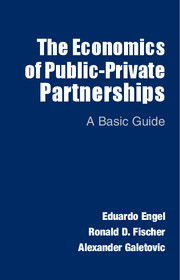Appendix
Formal Model
Published online by Cambridge University Press: 05 September 2014
Summary
In this appendix we formalize many of the economic arguments used throughout this book using a unified framework. The model we present distinguishes between user fees and government transfers as sources of finance for PPPs. The model also assigns an important role to demand uncertainty.
Result 1 formalizes our claim that preferring PPPs over public provision because PPPs release public resources is wrong. In our benchmark model, the optimal contractual arrangement under public provision is equivalent, from a social welfare perspective, with the optimal PPP contract. Result 2 shows how to implement the optimal infrastructure contract, both under conventional provision and under a PPP. Result 3 shows that, when the benchmark model is extended to incorporate the costs of disbursing public funds, PPPs are better than conventional provision and a PVR auction implements the contract. Results 4 and 5 establish the optimality of PPP contracts over conventional provision when we extend the benchmark model to incorporate moral hazard. These results combine the arguments in favor of PPPs from the “bundling” and “property rights” literatures. A PVR auction also implements the optimal contract. Result 6 shows that in the extension with moral hazard, higher financing costs under PPPs are socially desirable because they provide incentives for innovation.
- Type
- Chapter
- Information
- The Economics of Public-Private PartnershipsA Basic Guide, pp. 149 - 162Publisher: Cambridge University PressPrint publication year: 2014



